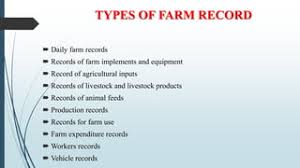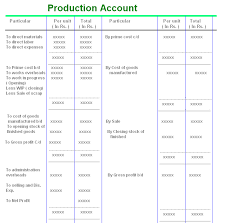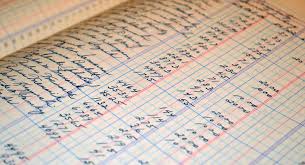Farm records are indispensable tools for effective farm management and informed decision-making. They serve as a detailed account of the day-to-day operations, resources, and overall performance of the farm.
Maintaining accurate and comprehensive records allows you as a farmer to track your farm progress, assess profitability, and identify areas for improvement. These records are not just administrative necessities but vital components that enhance farm productivity and sustainability.
Accurate farm records enable farmers to evaluate financial performance, ensuring that every decision is data-driven. They also support compliance with government regulations and are essential for financial reporting.
Whether you are managing a small-scale operation or a large agricultural enterprise, keeping detailed records is critical for smooth operations and long-term success.
Farmers need to maintain several types of records, such as consumption records, sales records, farm inventory, farm diary, etc. Each of these records provides unique insights into different aspects of the farm, thereby helping you to maintain oversight and control over resources and production levels.
The utility of farm records goes beyond tracking operational performance. For instance, when applying for loans, grants, or other financial support, lenders and financial institutions often require a clear and accurate representation of the farm’s financial situation. Without these records, obtaining external funding can become a significant challenge.
Farm records alao provide a foundation for forecasting and managing future expenses, enabling farmers to plan effectively for investments, expansions, or unforeseen costs.
Moreover, accurate records allow for better risk management by offering insights into production trends and helping farmers anticipate potential challenges before they arise.
In essence, maintaining well-organized farm records is vital for the success and sustainability of any farming business. These records form the basis for sound decision-making, financial management, and regulatory compliance.
Therefore, by maintaining detailed records, farmers can optimize their operations, reduce waste, and improve profitability ensuring that their farms remain resilient and profitable well into the future.
In this article, we are going to take you through the different types of farm record and uses of farm records.
Read Also: The External Anatomy of a Bony Fish
Types of Farm Records
Some of the types of farm records are enumerated below

1. Farm Diary: This is a record of day to day activities of the farm. It is possible to trace weakness in the farm business. Farm diary takes care of crops, date of planting, amount of seed used, harvest date, etc.
2. Farm Inventory: This record takes care of the livestock (types, number etc), buildings etc. It gives information on the state of the item, the ones that need replacement, repair, borrowed, or hired out.
3. Input Records: This record gives details of the size or quantity of input utilized to the farm e.g fertilizers, feed for livestock, amount of seeds used, labour, medication, stock of livestock etc. It enables the farmer know whether he is using too much animal feed or much seeds as the case maybe, before too much losses are incurred.
4. Production Records: This record measures the productivity of the land, and success of farming operations generally. It shows whether a particular livestock is doing well or not.
5. Scale Records: This record tells a farmer how much he is making. It helps the farmer not to spend too much and also help him in adequate farm planning.
6. Consumption Records: Not all produced are put to sale. This records the quantity harvested and consumed by the farmer and his family, or given out, but not sold.
7. Profit And Loss Accounts: This record has two sides. The left side has to do with liabilities and payments (purchased and expenses) While the right hand side is concern with Assets and Revenue (Sales and Receipts).
Basically there are three basic types of farm records: resources inventories, production accounts of livestock and crop operations, and income and expense records.
8. Resources Inventories: As a farmer you use resources such as land labour, machinery, breeding stock, Management and financial capital.
9. Farm Resources Inventories: Farm resources inventories involve listing all assets and inputs on a farm, like land, machinery, livestock, and labor. It helps farmers manage resources efficiently, plan operations, and make better decisions for farm productivity.
10. Production Accounts: Farm production accounts record the costs and revenues related to farming activities. They track inputs like seeds, labor, and fertilizers, alongside outputs such as crop yields or livestock sales. These accounts help farmers analyze profitability, monitor expenses, and make informed financial decisions to improve farm operations.

Read Also: Five Economic Importance of Tilapia Fish
Uses of Farm Records

Broadly speaking farm records are useful for the the following;
1. Financial Management: Farm records help track income and expenses, allowing farmers to assess profitability, plan budgets, and secure loans or credit from financial institutions.
2. Decision-Making: Records provide data on past performance, guiding farmers in making informed decisions about crop rotation, livestock management, and resource allocation.
3. Performance Evaluation: By comparing records over time, farmers can evaluate the success of farming practices and identify areas for improvement in productivity or cost efficiency.
4. Regulatory Compliance: Farm records ensure adherence to government regulations and standards, such as tax filing, environmental regulations, or food safety requirements.
5. Inventory Management: Keeping accurate records of inventory helps track farm assets like machinery, seeds, and livestock, ensuring they are properly maintained and available when needed.
6. Insurance and Compensation Claims: In cases of loss or damage, farm records provide evidence for insurance claims, ensuring farmers receive compensation for their losses.
7. Monitoring and Planning: Records of crop yields, weather patterns, and pest infestations allow farmers to plan better for future seasons and manage risks effectively.
8. Farm Productivity and Efficiency: Detailed records enable the identification of high-performing crops or livestock, improving the efficiency of farm operations.
9. Labor Management: Farm records help track labor use, wages, and productivity, ensuring optimal allocation of human resources.
10. Farm Valuation: Comprehensive records are essential when valuing a farm for sales, loans, or succession planning, providing accurate details on assets and liabilities.
In conclusion farm records are essential tools for managing any farming operation, whether subsistence or commercial. They provide a clear and organized view of the farm’s activities, from financial management to monitoring crop and livestock performance.
Do you have any questions, suggestions, or contributions? If so, please feel free to use the comment box below to share your thoughts. We also encourage you to kindly share this information with others who might benefit from it. Since we can’t reach everyone at once, we truly appreciate your help in spreading the word. Thank you so much for your support and for sharing!
Read Also: FaceBook: How to Advertise your Business on FaceBook for Better Results

